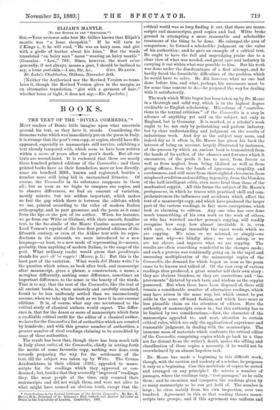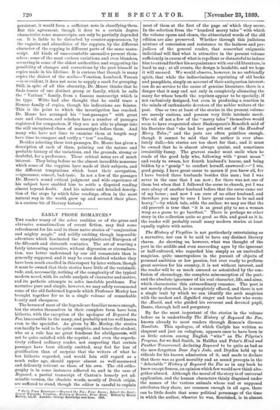BOOKS.
THE TEXT OF THE " DIVINA COMMEDIA."* MOST readers of Dante little imagine upon what uncertain ground his text, as they have it, stands. Considering the immense value which was immediately put on the poem in Italy, it is strange that the poet's own copy, or copies, should have dis- appeared, especially as manuscripts still survive, exhibiting a text already tampered with, which seem to have been written within a score of years after the poet's death. But all our texts are second-hand. It is reckoned that there are nearly three hundred printed editions of the Commedia ; and these printed books have as their foundation, more or less directly, some six hundred MSS., known and registered, besides a number more still lying hid in unexamined libraries. Of course, the Commedia in its substance reappears in them all ; but as soon as we begin to compare our copies, and to observe differences, we find an amount of variation, mostly minute, but not seldom important, which makes as feel the gap which there is between the editions which we use, printed according to the rules of modern Italian orthography, and in part grammar, and the poem as it came from the lips or the pen of its author. When, for instance, we go from our Witte or Giuliani, with their smooth, familiar text, to the fac-simile of the Monte Cassino manuscript, or Lord Vernon's reprint of the four first printed editions of the fifteenth century, or even of the Aldine text with its repro- -auctions in the sixteenth, we seem introduced to a new language—at least, to a new mode of representing it—nearer, probably, than anything of modern Italian, to the usage of the poet. What ordinary reader would guess that perokivegio stands for per ch' lo veggio ? (Moore, p. li.) But this is the least part of the variation. What words did Dante write P is the question which arises, as book after book, and manuscript after manuscript, gives a phrase, a construction, a name, a metaphor differently, making some difference, sometimes an important difference, to the sense or the beauty of the words. That is to say, that the text of the Commedia, like the text of all ancient books, is, when minutely and carefully examined, found to be less uniformly settled than we unconsciously assume, when we take up the book as we have it in our current editions. It is, of course, what any one accustomed to the critical study of classical authors would expect. The differ- ence is, that for the dozen or score of manuscripts which form a creditable critical outfit for the editor of a classical author, we have for the Commedia a list of authorities which are counted by hundreds ; and with this greater number of authorities, a greater number of rival readings claiming to be accredited by some of these authorities.
The result has been that, though there has been much talk in Italy about codici of the Commedia, chiefly in setting forth the merits of some favourite copy, nothing was done, even towards preparing the way for the settlement of the text, till the subject was taken up by Witte. The Crusca Academicians, in their edition (1595), appealed to manu- scripts for the readings which they approved or con- demned; but, besides that they avowedly "improved "readings, they, like most people at the time, only counted their manuscripts and did not weigh them, and were not alive to what might have seemed an obvious truth, except that the
• Contributions to the Textual Oriticism of the Dirina Commedia. By Rev. E. Moore, D.D., Principal of St. Edmund's Hall, Oxford, and Barlow Lecturer on Dante in the University of London. Cambridge. 1889. critical world was so long finding it out, £hat there are manu- scripts and manuscripts, good copies and bad. Witte broke ground in attempting a more reasonable and scholarlike treatment of the thing to be done. He enlarged the area of comparison; he formed a scholarlike judgment on the value of his authorities ; and he gave an example of a critical teat. He ought to have the full and ungrudging praise due to a clear view of what was needed, and great care and industry in carrying it out within what was possible to him. But his work was done under the disadvantages of a first attempt, and he
hardly faced the formidable difficulties of the problem which he would have to solve. He did, however, what no one had done before him, and what, perhaps, his successors must be for some time content to do,—he prepared the way for dealing with it satisfactorily.
The work which Witte began has been taken up by Dr. Moore in a thorough and solid way, which is in the highest degree creditable to English scholarship. His volume of " contribu- tions to the textual criticism" of the Commedia is a step in advance of anything yet said on the subject, not only in England, but in Germany. It is marked, as a scholar's work ought to be, not only by painstaking and patient industry, but by clear understanding and judgment on the results of industrious work. And dry as the subject may seem, and indeed dry as it often is, Dr. Moore has given his book the interest of being an account, largely illustrated by instances, of the process by which an ancient book is transmitted from the hands of its author, of the chances and fortunes which it encounters, of the perils it has to meet, from favour as well as from neglect, from being idolised as well as from giving offence, from the hands of ignorance, stupidity, and carelessness, and still more from short-sighted cleverness, from misplaced erudition and meddling ingenuity, from the blunders of the half-intelligent critic, even more fatal than those of the mechanical copyist. All this forms the subject of Dr. Moore's prolegomena, in which he traces with practised skill and com- prehensiveness the influences and accidents which affect the text of a manuscript copy, and which have produced the larger part of the various readings, in fact mere corruptions, which look so alarming to editors. Any one who has ever done much transcribing, of his own work or the work of others, or who has watched another person's copying, will readily recognise how easy, how almost inevitable it is, even with care, to change insensibly the exact words which we are copying. We miss, or we misread, or simply—we know not why—we blindly alter ; we are asleep, or we are too clever, and improve what we are copying. The results are often something wonderful in the changes made ; and such a process was continually going on, in the rapid and unceasing multiplication of the manuscript copies of the Commedia, the demand for which began as soon as the poem came to be known and talked of. Of the vast crop of various readings thus produced, a great number tell their own story : they are obvious blunders, or they are corrections and " im- provements" dictated by such taste and wisdom as the copyist possessed. But when these have been disposed of, there still remain a considerable number of alternative readings, which may have arisen in the same way, but which cannot be put aside in the same off-hand fashion, and which have more or less plausible claim on the attention of editors. Here the authority of manuscripts comes in ; but this authority has to be limited by two considerations,—first, the character of the manuscripts appealed to ; and next, attention to certain critical rules, which are only the application of experience and reasonable judgment, in dealing with the manuscripts. The immense mass of materials which confronts the critical editor of the Commedia, comprising copies which go back to a time not far distant from the writer's death, makes the sifting and classification of these copies a necessity, if he would not be overwhelmed by an almost hopeless task.
Dr. Moore has made a beginning in this difficult work, though, with the caution and modesty of a scholar, he proposes it only as a beginning. Can this multitude of copies be sorted and arranged on any principle P He selects a number of passages, where the readings vary, " test-passages," as he calls them ; and he examines and compares the readings given by as many manuscripts as he can get hold of. The number is large ; he cites, mainly from his own inspection, over two hundred. Agreement in this or that reading throws manu- scripts into groups; and if this agreement was uniform and
persistent, it would form a sufficient note in classifying them. But this agreement, though it does to a certain degree characterise some manuscripts, can only be partially depended on. It is liable to be disturbed by counter-appearances, by the vagaries and absurdities of the copyists, by the different character of the copying in different parts of the same manu- script. All kinds of unaccountable anomalies present them- selves: some of the most curious variations, and even blunders, occurring in some of the oldest authorities, and suggesting the possibility of changes and corrections by the poet himself in copies made in his lifetime. It is curious that though in many copies the dialect of the scribe—Venetian, Lombard, Tuscan —is so evident, it does not seem to supply a mark for grouping. Still, in spite of all this obscurity, Dr. Moore thinks that he finds traces of one distinct group or family, which be calls the " Vatican " family, from a famous manuscript which is its type. Witte had also thought that he could trace a Sienese family of copies, though his indications are fainter. This is the point to which the investigation has reached. Dr. Moore has arranged his " test-passages " with great care and clearness, and scholars have a number of passages registered for comparison, if they are not able to plunge into the still unexplored chaos of manuscripts before them. And many who have not time to examine them at length may have time to compare and verify a " test " reading.
Besides selecting these test-passages, Dr. Moore has given a description of each of them, pointing out the nature and probable history of the variations, and the grounds, strong or doubtful, for a preference. These critical notes are of much interest. They bring before us the almost incredible nonsense which some of the copyists have made of their subjects, and the different temptations which beset their occupation, —ignorance, conceit, bad-taste. In not a few of the passages Dr. Moore's sound critical judgment and wide experience of his subject have enabled him to settle a disputed reading almost beyond doubt. And his minute and detailed descrip- tion of the steps by which false readings, often in the most natural way in the world, grew up and secured their place, is a curious bit of literary history.







































 Previous page
Previous page